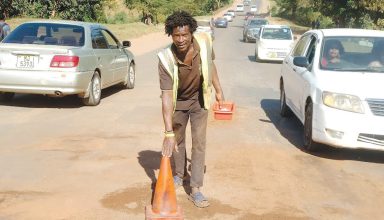Bars and sanitation woes in residential areas

Visiting the house of Steliya White at Chemusa Township in Blantyre during the day, one would think the house is empty. The doors and windows are always closed.
“We live like this around the clock because it smells bad outside. We are surrounded by bars and rest houses and drunkards urinate everywhere which creates a bad smell,” says White.
Traits of urine are visible on the ground, with part of the house’s brick perimeter fence soaked in urine, creating a tough stench
White, 32, hardly recalls the last day the family took a meal outside the house.
“It is probably during the change from one party to multiparty system because that is the time most of these bottle stores opened here. At first, it was normal because most of the drinking joints were bottle stores, but with time, the dealers started to open bars and sell traditional beer,” she says.
White’s house is surrounded by a bottle store, bar and a rest house. The closest bar is 50-50 Cambodia which sells the locally brewed beer. Behind the house is a rest house where most sex workers at the premises live.
“We constructed a brick perimeter fence to separate our house from the bar because drunkards would urinate in our yard during the night. Unfortunately, they now urinate on the fence,” she says, adding that they have complained to the bar owners several times, but nothing changes.
Clearly, people living in the neighbourhood inhale contaminated air. There are two new toilets under construction, but according to White, the work stalled almost a year ago. Meanwhile, imbibers use a pit latrine nearby, which is full and has no roof, emitting a strong smell to the environment.
“We want modern toilets, but we do not have money. We will finish the work shortly because what is remaining is roofing and fixing the doors. At the moment, we are seeking support from Blantyre City Council to help us drain the pit so that we can continue using it as we wait to finish with the construction,” says Clement Guta, who runs 50-50 Cambodia bar on behalf of his brother.
He admitted to receiving complaints from people in the neighbourhood and says they are committed to improving the situation.
“We feel helpless because the bar operators are renting the premises. Now that summer is here, the stench will be even worse.
“Again, the bars operate throughout the night, which means this place is always noisy. I wonder if there are any laws to protect us,” laments another resident, Christian Juwa.
This situation is not unique to Chemusa. There are many drinking joints operating in residential areas with similar poor conditions across the country. In Zingwangwa, Chilomoni, Chirimba and Mbayani in Blantyre; Area 36 and Ntandire in Lilongwe; and Masasa and Chibanja townships in Mzuzu, similar situations exist.
Most bars and bottle stores are substandard and operate without proper urinal fences and toilets, which worsens sanitation problems in the country.
This is against the Liquor Licensing Act which recommends that any business patronised by the public should operate away from residential areas and have a strong and stable structure, toilets and urinal sheds. Yet, as director of health at Blantyre City Council Dr Emmanuel Kanjunjunju admits, most drinking joints operate without these basic amenities.
“Businesses, including drinking joints, are issued licences after satisfying the conditions for the certificate. I am surprised that such bars are operating. Share with us the details of the bars and we will check in our files to see the type of licence they hold to take a proper action,” said Kanjunjunju in a phone interview.
Tamara Chafunya, spokesperson for Lilongwe City Council, laments the situation, saying it has worsened in the past 10 years. She says there has been a boom of liquor business in residential areas and most operate without proper urinal facilities and others without licences.
She, however, blames it on the absence of a liquor licensing board (which is supposed to comprise councillors) that has the full mandate to pass stiffer decisions on action to be taken and also enforce the law at hand.
“This has been the greatest challenge for the council to regulate such disparities. Suffice to say that we are pleased that we now have councillors, and this is a plus to pulling up from where we left while reinforcing the liquor licensing board to see that there is law and order within the city and that residents are abiding to the same,” Chafunya says.
She says the council has an active inspectorate section which routinely inspects bars and bottle stores, closing and revoking licences from non-complying business operators.
A recent sanitation report by Unicef notes that lack of toilets and urinal fences at both household and public places is a big problem in Malawi, a situation contributing to poor sanitation levels. In the report, Malawi is off-track in achieving the Millennium Development Goal (MDGs) on sanitation.
An environmental lecturer at The Polytechnic, Save Kumwenda, says there is need for law enforcement to ensure premises used for business abide by the laws.
He also commends government for supporting construction of toilets in public places, saying it is a foundation to improving sanitation in public places.
Consumers Association of Malawi (Cama) executive director John Kapito blames city and district councils for not monitoring businesses operating in their areas. He wonders how such businesses are issued licences.
Kapito adds that councils ought to monitor licensed businesses frequently to ensure standards are adhered to, a thing which he says lacks in most public offices.





